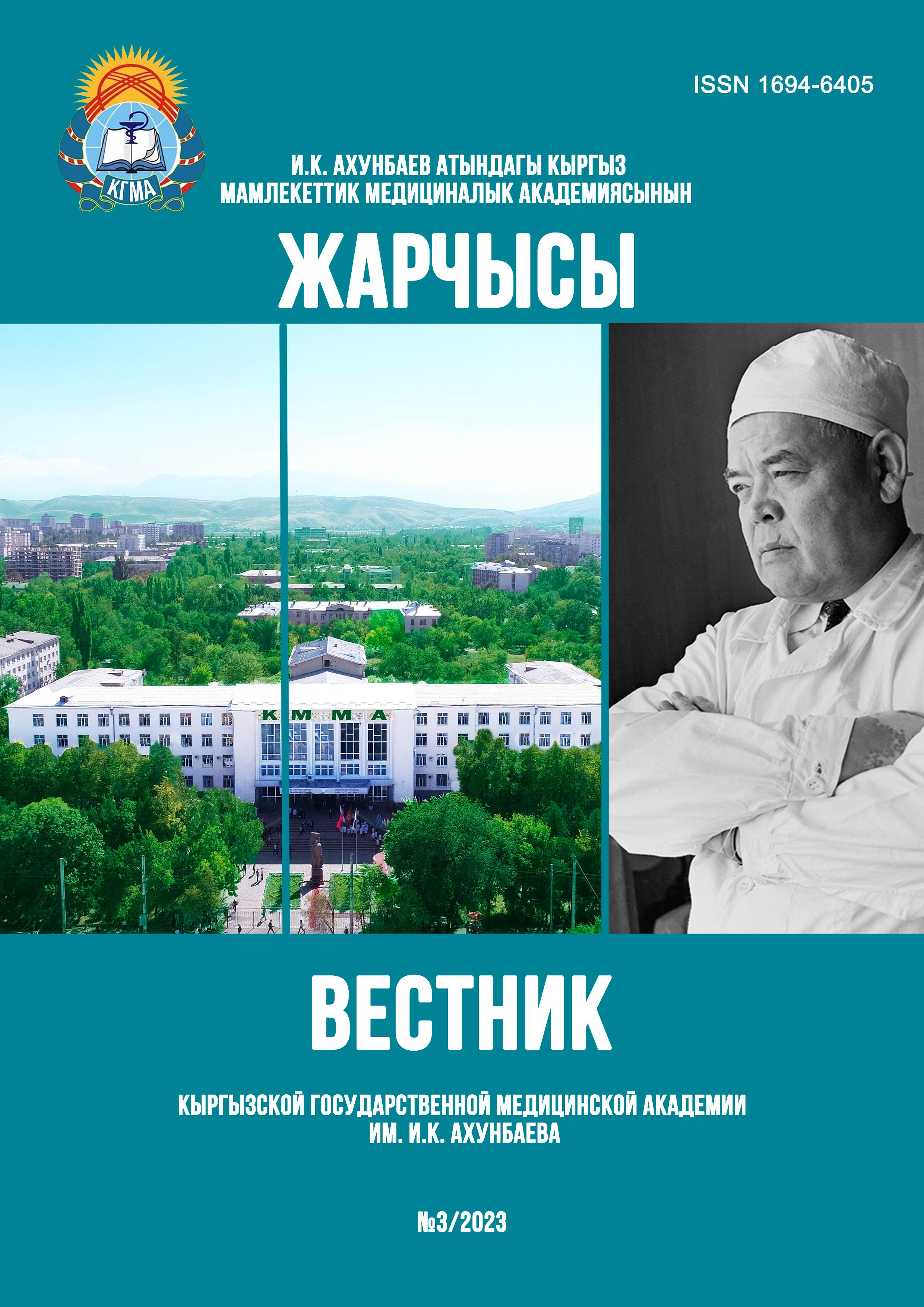INFECTIONS IN THE AREA OF SURGICAL INTERVENTION IN OPEN SURGERY IN UROLOGY
DOI:
https://doi.org/10.54890/1694-6405_2023_3_63Abstract
Infections of the surgical intervention area, among all postoperative infectious complications, develop in 40%, of which one third are associated with an organ or cavity and two thirds with the area of the surgical wound. The current situation is the reason for long-term treatment in the hospital, and in many cases, re-hospitalization.
Postoperative infectious-inflammatory complications associated with surgical care are a pressing issue worldwide. Regardless of modern scientific achievements in the field of surgery, the occurrence of infectious-inflammatory complications in every 5 operated patients discussed in the article is the
subject of further study of this problem. The problem of postoperative infectious complications in urology is still relevant. Frequency, structure, and peculiarities of the development of infections of the area of open surgical intervention in 577 patients of the urological profile in the tertiary care hospital were studied retrospectively. Postoperative infectious complications were noted in 23.6% of the operated patients. The presence of a drainage tube in the postoperative period increases the risk of infectious and inflammatory complications in the entire cohort of openly operated patients. On the contrary, the use of PAP in patients reduces the incidence of infectious-inflammatory complications. The obtained result is the reason for further investigation of the problem in order to improve the quality of the prevention of complications in the postoperative period, decrease the number of bed- days, decrease the financial expenses and the frequency of reapplications.
Keywords:
urinary tract infections, operative urology, perioperative antibiotic prophylaxis, postoperative infectious and inflammatory complications, wound drainage, microbial contamination, antibiotic resistance.References
1. Всемирная организация здравоохранения. Всемирный альянс за безопасность пациентов. Программа перспективного развития. Лондон: ВОЗ. 2005; 340 с.
2. Bickler S, Spiegel D. Improving Surgical Care in Low- and MiddleIncome countries: A pivotal role for the World Health Organization. World J Surg. 2010;34(3):386-390. https://doi.org/10.1007/s00268-009-0273-2
3. Bickler S., Spiegel D. Global surgery-defining a research agenda. The Lancet. 2008;372(9633):90-92. https://doi.org/10.1016/S0140-6736(08)60924-1
4. Chu K. Open Letter to Young Surgeons Interested in Humanitarian Surgery. Arch Surg. 2010;145(2):123-124. https://doi.org/10.1001/archsurg.2009.253
5. Kushner AL, Cherian MN, Noel L, Spiegel DA, Groth S, Etienne C. Addressing the Millennium Development Goals From A Surgical Perspective. Essential Surgery and Anaesthesia in 8 Low- and Middle-Income Countries. Arch Surg. 2010; 145(2):154-159.
6. Urbach D, Morris A. Health Care Reform and Comparative Effectiveness: Implications for Surgeons. Arch Surg. 2010; 145(2):120-122.
7. Mangram AJ, Horan TC, Pearson ML. Silver LC, Jarviset WR. Guideline for prevention of surgical site infection, 1999. Hospital Infection Control Practices Advisory Committee. Infect Control Hosp Epidemiol. 1999;20(4):250-278. https://doi.org/10.1086/501620
8. Грушевская Е.А. Комплексный подход к профилактике и лечению инфекции области хирургического вмешательства [диссертация]. Уфа: БГМУ. 2020.
9. А.Ч. Усупбаев, Кабаев Б.А., Иманкулова А.С., Садырбеков Н.Ж., Чолпонбаев К.С., Усупбаева А.А. Послеоперационные инфекционные осложнения у больных с мочекаменной болезнью. Исследования и практика в медицине. 2018;5(1):30-37.
10. Кожомкулова К.А., Иманкулова А.С., Усупбаев А.Ч., Садырбеков Н.Ж., Оскон У., Кабаев Б.А. Факторы риска развития инфекции области хирургического вмешательства у пациентов урологического профиля. Научное обозрение. Медицинские науки. 2022;4:57-61. https://doi.org/10.17513/srms.1273
11. Иманкулова А.С., Кожомкулова К.А., Кабаев Б.А., Эмилбеков Ф.М., Толбашиева Г.У., Кудайбердиев А.А. и др. Современные подходы улучшения практики применения антимикробных препаратов в хирургии. Вестник КГМА им. И.К. Ахунбаева. 2021;5-6:43-50.
12. Гусаров В.Г., Карпов О.Э., Замятин М.Н. Антибиотикорезистентность хирургических инфекций: современное состояние проблемы. Вестник Национального медико-хирургического Центра им. Н.И. Пирогова. 2017;12(2):95- 102.
13. Брусина Е.Б., Ковалишена О.В., Цигельник А.М. Инфекции, связанные с оказанием медицинской помощи в хирургии: тенденции и перспективы профилактики. Эпидемиология и вакцинопрофилактика. 2017;16(4):73-80.
14. Акилов Ф.А., Мухтаров Ш.Т., Гиясов Ш.И., Мирхамидов Д.Х., Насиров Ф.Р., Муратова Н.Б. Послеоперационные инфекционно-воспалительные осложнения эндоскопических операций по поводу уролитиаза. Урология. 2013;1:89-91.
15. Иманкулова А.С. Оценка использования антибиотиков по классификации всемирной организации здравоохранения AWARE и анализ данных по их потреблению на стационарном уровне в Кыргызской Республике. Вестник КГМА им. И.К. Ахунбаева. 2022;4:10-18. https://doi.org/10.54890/1694-6405_2022_4_10







